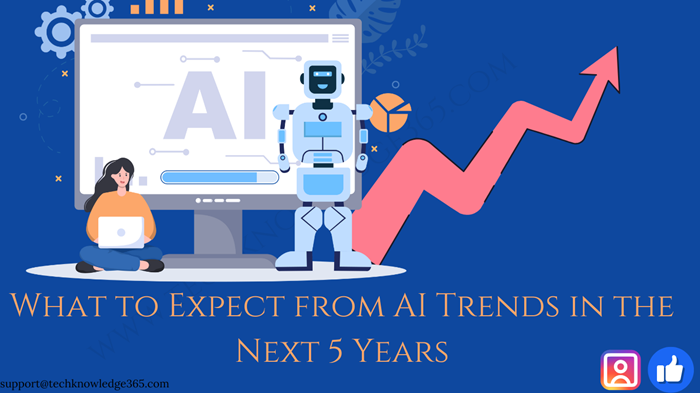Table of Contents
ToggleAI Trends in the Next 5 Years

Expect from AI Trends in the Next 5 Years
Artificial intelligence (AI) is rapidly transforming the way we live, work, and interact. Over the past decade, we’ve witnessed AI evolve from niche applications to a critical force driving innovation in almost every industry. With advancements accelerating, the next five years promise to bring groundbreaking changes that will redefine our world.
In this blog, we’ll explore the most anticipated AI trends for the next five years, their potential impact on society, and what this means for businesses, professionals, and consumers alike.

1. Hyper-Personalization Across Industries
AI-powered personalization is set to become even more advanced, impacting industries like retail, entertainment, and healthcare. Using machine learning algorithms, businesses will deliver hyper-customized experiences tailored to individual preferences and needs.
Major developments:
- Retail: Virtual shopping assistants powered by AI will recommend products based on a customer’s browsing habits, purchase history, and even real-time emotions.
- Entertainment: Streaming platforms like Netflix and Spotify will refine recommendation engines to predict mood-based preferences and adapt to unique viewing or listening habits.
- Healthcare: AI will tailor treatment plans based on a patient’s genetic makeup, medical history, and real-time health data, enhancing precision medicine.

2. Evolution of Generative AI
Generative AI, which creates content like text, images, and videos, has already gained momentum through tools like ChatGPT, DALL·E, and MidJourney. Over the next five years, generative AI will become more sophisticated, enabling high-quality, realistic outputs across diverse fields.
Expected Advances:
- Content Creation: AI will automate video production, music composition, and even scriptwriting for movies and advertising campaigns.
- Education: Generative AI will personalize learning materials, creating textbooks, quizzes, and explanations adapted to a student’s pace and style of learning.
- Design and Art: Designers will collaborate with AI to create stunning visuals, architecture blueprints, and even virtual environments for the metaverse.

3. Mainstream Adoption of Autonomous Systems
Autonomous technologies will extend beyond self-driving cars into other domains like drones, robotics, and industrial automation. AI-powered systems will become integral to improving efficiency and reducing human error in various sectors.
Key Areas:
- Transportation: Fully autonomous vehicles will likely hit the roads, offering safer and more efficient commutes. Autonomous delivery drones will also become widespread, especially for last-mile logistics.
- Agriculture: Smart farming tools will utilize AI-powered drones and robots for tasks like crop monitoring, irrigation, and harvesting, boosting agricultural productivity.
- Healthcare: Surgical robots will become more autonomous, assisting in complex procedures with precision and minimal invasiveness.

4. AI Ethics and Regulation Will Take Center Stage
As AI becomes more pervasive, ethical concerns and regulatory challenges will grow. Issues like data privacy, algorithmic bias, and accountability for AI decisions will demand attention.
What to Expect:
- Stronger AI Governance: Governments and organizations will develop standardized guidelines to ensure ethical AI development and deployment.
- Bias Mitigation: AI developers will prioritize fairness, creating models that minimize biases related to race, gender, and socioeconomic status.
- Transparency and Explainability: Efforts to make AI systems more interpretable will intensify, allowing users to understand how decisions are made.

5. The Rise of AI-Powered Healthcare Solutions
Healthcare will be one of the biggest beneficiaries of AI advancements in the next five years. From diagnosis and treatment to administrative efficiency, AI will revolutionize medical practices.
Key Innovations:
- Early Disease Detection: AI algorithms will analyze medical imaging and patient data to identify conditions like cancer, heart disease, and neurological disorders at earlier stages.
- Virtual Health Assistants: AI-powered chatbots and assistants will provide basic consultations, medication reminders, and mental health support.
- Drug Discovery: Machine learning will accelerate drug development, identifying potential treatments faster and at a lower cost.

6. Enhanced Human-AI Collaboration in the Workplace
AI will continue to augment human capabilities, reshaping how we work. Rather than replacing jobs, AI will enhance productivity by taking over repetitive tasks and enabling workers to focus on strategic activities.
Key Trends:
- Creative Professions: AI tools will assist writers, designers, and marketers in brainstorming ideas and executing projects faster.
- Customer Support: Advanced chatbots will handle complex customer inquiries, escalating only the most critical issues to human agents.
- AI Co-Pilots: Many professionals, such as software developers and financial analysts, will use AI-powered assistants to streamline workflows, identify insights, and automate routine tasks.

7. Growth of Edge AI
Edge AI, which processes data locally on devices rather than in centralized data centers, is poised to become a significant trend. By reducing latency and enhancing privacy, edge AI will enable faster, more secure applications.
Key Applications:
- Smart Devices: AI in smartphones, wearables, and IoT devices will perform tasks like speech recognition, facial recognition, and activity tracking without relying on the cloud.
- Industrial IoT: Factories will deploy edge AI for real-time monitoring and predictive maintenance of equipment.
- Healthcare Devices: Wearables with edge AI will provide continuous health monitoring and alert users to anomalies without needing internet connectivity.

8. AI and the Metaverse
AI will play a central role in building and maintaining the metaverse—a virtual space where people interact through digital avatars and immersive experiences.
Future Possibilities:
- Real-Time World Building: AI algorithms will create dynamic virtual environments that adapt to user interactions.
- Personalized Avatars: AI will generate hyper-realistic avatars, reflecting users’ physical appearances or desired traits.
- Immersive Learning: Virtual classrooms in the metaverse will use AI to simulate real-world scenarios, enhancing hands-on learning experiences.

9. AI in Environmental Sustainability
AI will help address global environmental challenges by promoting sustainable practices and reducing waste.
Key Contributions:
- Climate Modeling: AI will analyze vast datasets to predict climate patterns and guide mitigation strategies.
- Energy Optimization: Smart grids powered by AI will improve energy distribution and consumption efficiency.
- Conservation Efforts: AI will aid in monitoring wildlife populations, detecting illegal activities like poaching, and managing natural resources sustainably.

10. Democratization of AI
AI tools and platforms will become increasingly accessible to individuals and small businesses. User-friendly interfaces and no-code/low-code AI solutions will empower non-technical users to harness the power of AI.
Key Outcomes:
- Startups and Entrepreneurs: Small businesses will leverage AI for marketing, customer analytics, and operations without requiring expensive resources.
- Education: AI tools will be integrated into classrooms, providing personalized learning for students and enabling teachers to focus on creative aspects of teaching.
- Developing Nations: Affordable AI solutions will drive innovation in healthcare, education, and agriculture, particularly in underserved regions.
Challenges to Watch Out For
While the future of AI is promising, several challenges will need to be addressed:
- Data Privacy: Ensuring user data is protected as AI systems grow more data-intensive.
- Job Displacement: Managing transitions for workers whose jobs are impacted by automation.
- Cybersecurity: Mitigating risks associated with AI-powered cyberattacks.
- Global Inequality: Preventing a digital divide where only certain countries or groups benefit from AI advancements.
Conclusion
The next five years will be a pivotal period for AI, marked by rapid advancements and widespread adoption. From revolutionizing healthcare and enhancing personalization to driving sustainability and democratizing access, AI will reshape how we live and work. However, addressing ethical concerns, ensuring inclusivity, and mitigating risks will be equally important to ensure AI serves humanity positively.
As businesses and individuals, staying informed and proactive in embracing AI trends will be key to thriving in this exciting era of transformation. The question is not whether AI will change our lives—it’s how prepared we are to harness its potential.
See More..
AI Trends in the Next 5 Years AI Trends in the Next 5 YearsAI Trends in the Next 5 YearsAI Trends in the Next 5 YearsAI Trends in the Next 5 YearsAI Trends in the Next 5 YearsAI Trends in the Next 5 YearsAI Trends in the Next 5 YearsAI Trends in the Next 5 Years
About Author:
Hello, I’m md ghulam ahmad, and I’m the founder of techknowlwdge365.
I’ve always been passionate about writing, and in college, I wrote a lot of content for my school’s website. After graduating, I pursued that passion professionally by creating content for small businesses.
I love what I do because it allows me to use my writing skills in a way that is directly applicable to people’s lives. My clients are all so grateful for the work that I do for them, and I feel so lucky every time someone tells me how much they appreciate my work.
I look forward to hearing from you!



